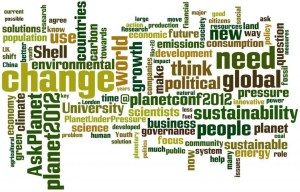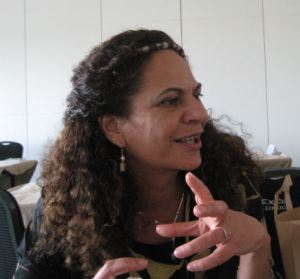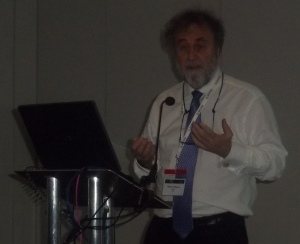Aisling Irwin
Consultant news editor, SciDev.Net
Planet Under Pressure is over. We’ve heard from eminent sociologist Antony Giddens about the ineffective, virtual world of conferences; we’ve heard from technology policy specialist Nigel Cameron about the scientific bubble that has no purchase on the real world. Did PuP, as we came to call it, have ‘cling’ power?
Did the plane fares, the carbon offset fees, the daily lives left in suspension, the mammoth, expensive, conference apparatus, merit the effort — or could it all have been better directed, as one senior delegate argued , towards actually tackling environmental problems?

Most commonly used words in questions asked during the first three plenaries of the conference
Planet Under Pressure
Some over-used words at the meeting no longer have ‘cling power’ with me. I apologise for this but words like ‘engagement’, ‘governance’, ‘value-change’ and ‘empowerment’ slide off my tired consciousness leaving nothing behind.
But, because of this, one of the delights of this conference was the way in which social scientists offered routes away from these increasingly empty terms. Their presentations helped explain why scientists are modern-day Cassandras – accurately prophesying doom (and, in their case, repeatedly prescribing engagement, governance and empowerment) — but destined never to be heeded.
Values don’t just change to order: scientists have to be a bit more sophisticated than that. This was made compellingly clear by sociologist Kari Marie Norgard. She presented a mind-boggling (to a humble science reporter) analysis of personal, cultural and social attitudes to climate change based on the nested theory of sociologist Pierre Bourdieu.
She convincingly demonstrated that the climate change message is so damaging to our perceptions of ourselves, on all three levels, that it is no wonder we ignore it.
From Richard Wilkinson there was the insight that some values do alter with the changing level of equality in society. From governance expert Oran Young, we saw that common crises (World War II, the Great Depression) can drive bickering nations into new ways of governing themselves at a global level. This linked with a call from panellist Pamela Collins for a ‘global patriotism’ – a kind of wartime footing that would bring out the collective best in us and see us acting for the global good.
And the insight from several sub-captains of industry (including oil company Shell and UK waste company Viridor) seemed to be: don’t bother with complex, value-changing engagement strategies – slap the right tax on us and we will innovate our way in a new, greener direction.
I wonder if the social scientists picked up similarly illuminating titbits from the natural sciences. Surely this meeting has been a success in fostering links between them (in addition, of course, to Future Earth – the vast, tangible conference outcome).
When I asked a number of senior organisers, before the meeting, how I would know if it had been a success or not, they all told me that its uniqueness (which lay mostly in its interdisciplinarity) meant it was already a success, simply by existing.
More formal negative and positive analyses will emerge over the next months (and see our final news story here). But for me, at least, it did shed light on why scientists’ exhortations fail and what might begin to solve the problem.
This blog post is part of our Planet Under Pressure 2012 coverage — which takes place 26–29 March 2012. To read news and analysis from the conference please visit our website.




 Posted by scidevnet
Posted by scidevnet 










You must be logged in to post a comment.